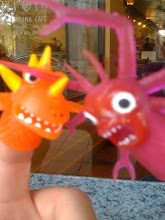 The movie opens in silence. Life was winding down for Jack Nicholson's Warren Schmidt as he looks up at the the ticking clock illustrating what he's done his whole life - watched time go by quietly. He's retiring after accomplishing little that would be remembered in his company and field - his final title is a Vice President of Underwriting in a life company of an insurance company. Alexander Payne's About Schmidt comes a couple of years before Sideways and a few after Election. The comedy is subtle - only to be trumped by its immense sadness. In that sad comedy lies a truthful look at life - constantly illustrating that the real world is much funnier than what is dreamed up by Hollywood.
The movie opens in silence. Life was winding down for Jack Nicholson's Warren Schmidt as he looks up at the the ticking clock illustrating what he's done his whole life - watched time go by quietly. He's retiring after accomplishing little that would be remembered in his company and field - his final title is a Vice President of Underwriting in a life company of an insurance company. Alexander Payne's About Schmidt comes a couple of years before Sideways and a few after Election. The comedy is subtle - only to be trumped by its immense sadness. In that sad comedy lies a truthful look at life - constantly illustrating that the real world is much funnier than what is dreamed up by Hollywood.Certainly something that I appreciate in this movie are the actors who look like regular, normal people. Warren Schmidt's wife looks like someone who could live next door to you. The couple who invites him to their camper look like...campers. The building Warren Schmidt worked at looks like a regular building and his house looks like a normal house. I could go on. One thing that, I believe, makes the audience find this movie endearing is due to how easy it is to see others you know, or even yourself, in the characters. The way Warren pens his thoughts about his wife, Helen, or the way he comments about the trials of traffic upon a long trip to visit his daughter, you begin to know him and realize you already know someone like him. This element appeals to the charm of the movie. The blue eyeshadow on Jeannie and Hummel figures Warren collects - each detail telling the story and making everything make a little more sense.
I remember watching this movie in the theater. Alicia and I went with friends from work - an insurance company. Even though Alicia and I loved it, our friends - who are little bit older than the two of us - didn't. When I talked with the two of them later to try to get to the bottom of what they didn't like about the movie. They couldn't really point to anything specific. They liked the performances and laughed out loud at some things. I think what they had a problem with was just how real it was - but more poignantly the film forces us to consider, "What's the meaning of life?" It's a question that Schmidt didn't even know he was looking to discover it until the life he knew was over. In order to make something like that work - the people have to look real. The places need to be places that we recognize. There's no romanticism. There's no dream-come-true. It's just a slice of life.
A slice of life served with a side of heartache and despair. I could see the story being a hard one to swallow. I suppose it depends upon what you want to get out of a movie you see. Through the harsh realism, however, there is some strange delight in the quirky characters, empty rooms, tacky weddings, and letters to Ndugu.
Schmidt's journey to find meaning to his life starts with his retirement, the loss of his wife and takes him on a cross country journey to his daughter's wedding - to a man he feels doesn't deserve her. About Schmidt illustrates a coming of age story for someone at the end of his life. Knowing Nicholson - we anticipate him to have a "Jack" moment. When Jeannie's fiance, Randall, approaches him to invest in a pyramid scheme - we expect a "Jack" moment. When Randall's mother screams and curses at her ex-husband - we expect a "Jack" moment - and finally, when asked to give the toast at his daughters wedding, the "Jack" moment never happens. Instead, he goes on with living his life responsibly - true to his nature. And when the movie draws to it's close and we watch Schmidt find meaning in his life - we get our "Jack" moment that is touching, beautiful and real. He says, "It's a buyer." If you're a Jack Nicholson fan, this will be a movie that you'll watch to see a range that we knew Jack had but delivered with a silent, reserved approach that he has never given us. You've seen One Flew Over The Cuckoo's Nest, The Shining and A Few Good Men - but you've never seen Jack like this. Of all my Nicholson movies, I'm glad this is the first I was able to tell you About.

Oh yea! I absolutely adored this movie. The last scene, the letter, chokes me up every time. Nicholson was extraoridinary is this film, dismissing any speculation that he was becoming a parody of himself. Its like schmidt was going through the motions, and discovers he has more depth than anyone he has been surrounded with. Loved hope davis and kathy bates was hysterical. The scenes between she and schmidt were so funny, could cut the tension with a knife, and geniously played. Thanks for this!
ReplyDeleteKymberly harris, theatrescool